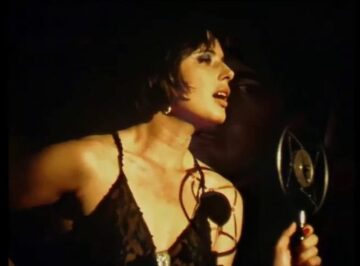

Blue had a big moment in 1990’s European arthouse cinema, in films like Krzysztof Kie?lowski’s Three Colours: Blue and Derek Jarman’s auto-elegiac Blue, the last film the director made before his death in 1995; blue as a color of impossible love, loss, and death — moods and themes deeply intertwined with music in both films and both directors’ oeuvres. But where would the color blue in art house cinema be without David Lynch’s 1986 Blue Velvet, the surreal neo-noir that introduced Lynch to Brooklyn-born composer Angelo Badalamenti, and thus began one of most creative of art house relationships between cinema and music?
Badalamenti first joined the film’s production not as a composer but as a voice coach for star Isabella Rossellini, who played a risky role not only because of Blue Velvet‘s sadomasochism and nudity, but also because she was cast as a lounge singer, even though, as Rossellini admits, she couldn’t sing. “My friend Peter Runflo said Lynch was shooting in North Carolina and Isabella Rossellini wasn’t happy with the people teaching her to sing,” Badalamenti tells Spirit and Flesh magazine.
“I said, ‘You can get anybody for that. I gotta wash my car.’ [laughs] I was more into arranging and orchestrating and didn’t know who David Lynch was. But he convinced me by saying it’s a Dino De Laurentiis movie – I knew that name. I met with Isabella and after a couple of hours with a piano and a little cassette recorder, we got a decent vocal.”
Lynch wanted Badalamenti to stick around and write a theme that sounded like the Cocteau Twins’ “Song of the Siren,” his favorite song at the time, which he couldn’t afford to license. The result was “Mysteries of Love,” sung by another stalwart Lynch musical collaborator, Julee Cruise. But it was the vocal stylings of Dorothy Vallens that gave the film its title and its prevailing mood. “Adorned in blue eyeshadow, carmine lipstick and a cheap wig, Dorothy sings in a joint called ‘The Slow Club,'” writes The New York Times’ Laurie Winer, “Performing only ballads with the word ‘blue’ in the title, she manages to put together a tattered glamour, like a remnant from a 40’s movie, that is palpably distressing when her stare floats out into the smoke-filled club.”
Lit in lurid blue light, Rossellini sings the film’s “Blue Velvet/Blue Star” medley in a smoky contralto, recalling Wassily Kandinsky’s observation, “the color blue can even cause a temporary paralysis.” In the video at the top, a YouTube user has reconstructed Rossellini’s full rendition of the titular song, a Number One hit in 1963 for Bobby Vinton and a breakout hit in 1951 for Tony Bennett. “Pardon the huge quality dip (and total mono for aural consistency),” the video’s creator notes, “but short of a new soundtrack release using the master, this is the most complete version of this we’ll be getting.”
The images and audio were cobbled together from the original 1990 soundtrack, German Filmmaker Peter Braatz’s 2016 documentary, Blue Velvet Revisited, a VHS copy of the film, and the original film audio. Like Nico, another heavily-European-accented former model whose monotone defined a new art movement, Rossellini’s tuneless lounge act announced a new surrealist aesthetic that would reach the mainstream with Blue Velvet‘s prominence upon its release. The lasting impact of Lynch’s love of blue on the following decade’s cinema deserves a study all its own, and we should always mark Blue Velvet as the first meeting of two artists (two “brothers,” Badalamenti says) who did more to marry cinematic color and musical mood than perhaps any two collaborators in the art form.
Related Content:
The Surreal Filmmaking of David Lynch Explained in 9 Video Essays
Josh Jones is a writer and musician based in Durham, NC. Follow him at @jdmagness
Hear Isabella Rossellini Sing “Blue Velvet” in Its Entirety is a post from: Open Culture. Follow us on Facebook and Twitter, or get our Daily Email. And don't miss our big collections of Free Online Courses, Free Online Movies, Free eBooks, Free Audio Books, Free Foreign Language Lessons, and MOOCs.
from Open Culture https://ift.tt/3wJki42
via Ilumina


Comments
Post a Comment